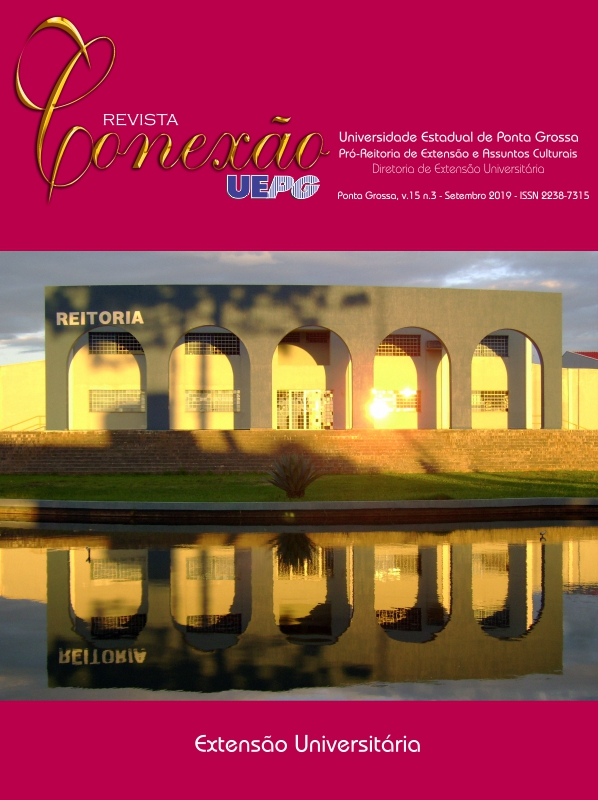TEACHER TRAINING ON SCHOOL INCLUSION: THE HISTORICAL-CULTURAL PSICOLOGY AND HISTORICAL-CRITICAL PEDAGOGY CONTRIBUTIONS
DOI:
https://doi.org/10.5212/Rev.Conexao.v.15.i3.0005Keywords:
Historical-cultural psychology, Inclusive education, Teacher formation.Abstract
This article aims to report and discuss the results of an extension project about teacher education, focusing on school inclusion. It is based on the contributions of Vygotsky (1997), Saviani (2013, 2018), Leontiev (2005) and Martins (2015) on the subject. This proposal is established from the feeling of uneasiness over the teachers that work with students with cognitive and mental disability and are unprepared to deal with them. It is divided into three parts: (1) the problematization of the teaching practice, highlighting the importance of mediation and cognitive development of students with disabilities; (2) the description of the teacher training experience, which provided opportunity to propose and debate inclusive practises, and (3) the discussion of the results and possible contributions of Vygotsky's studies to the reality of the inclusive school classroom. It is concluded that historical-cultural psychology and historical-critical pedagogy could be a fundamental element to construct strategies for teacher training on inclusion of students with disabilities.
Downloads
References
CASTORINA, José A.; BAQUERO, Ricardo J. Dialética e Psicologia do Desenvolvimento: o pensamento de Piaget e Vygotsky. Porto Alegre: Artmed Editora. 2009.
DAVIS, Cláudia Leme Ferreira et al. Abordagens vygotskiana, walloniana e piagetiana: diferentes olhares para a sala de aula. Psicol. educ.,_ São Paulo ,_ n. 34,_p. 63-83,_jun._ 2012 . _ Disponível em: <http://pepsic.bvsalud.org/scielo.php?script=sci_arttext&pid=S1414-69752012000100005&lng= pt&nrm=iso>. Acesso em:_ 23_ fev._ 2017.
DOMINGUES, Taciano L. C.; CAVALLI, Mariana R. Inclusão escolar, subjetividade e docência. Revista Educação Especial, Santa Maria, n.28, 2006.
CURY, Carlos R. Jamil. Educação e Contradição: elementos metodológicos para uma teoria crítica do fenômeno educativo. São Paulo: Cortez, 1985.
INSTITUTO FEDERAL DO PARANÁ. Resolução 13 de 01 de setembro 2011. Aprova a Mudança e Consolida o Estatuto do Instituto Federal do Paraná. Disponível em: <http://reitoria.ifpr.edu.br/wp-content/uploads/2010/06/Estatuto-consolidado-atualiza%C3%A7%C3%A3o-06.02.2015.pdf>. Aceso em: 10 mar. 2016.
LEONTIEV, Alexis et al. Psicologia e pedagogia: bases psicológicas da aprendizagem e do desenvolvimento. Centauro: São Paulo, 2005.
MARX, Karl. A ideologia Alemã. Rio de Janeiro: Civilização Brasileira, 2007.
MÉSZÁROS, István. Educação para além do capital. 2.ed. São Paulo: Boitempo, 2008.
MARTINS, Ligia Márcia. O Desenvolvimento do Psiquismo e a Educação Escolar: contribuições à luz da psicologia histórico cultural e da pedagogia histórico crítica. Campinas: Autores Associados, 2015.
SAVIANI, Demerval. História das ideias pedagógicas no Brasil. 4.ed. Campinas: Autores Associados, 2013.
SAVIANI, Demerval. O conceito dialético de mediação na Pedagogia Histórico-Crítica em intermediação com a Psicologia Histórico-Cultural. Germinal: Marxismo e Educação em Debate, Salvador, v. 7, n. 1, p. 26-43, dez. 2014. ISSN 2175-5604. Disponível em: <https://portalseer.ufba.br/index.php/revistagerminal/article/view/12463>. Acesso em: 10 jul. 2018.
SMEHA, Luciane N., FERREIRA, Iolete de Vlieger. Prazer e Sofrimento nos processos de inclusão escolar. Revista Educação Especial, Santa Maria, n. 31, p. 37-48, 2008.
SMEHA, Luciane N., FERREIRA, Iolete de Vlieger. Formação social da mente. São Paulo: Martins Fontes, 1991.
VYGOTSKY, Lev Semiónovic. Fundamentos de defectologia. In: Obras completas. Tomo V. Trad. de Maria del Carmen Ponce Fernandez. Havana: Editorial Pueblo y Educación, 1997. p. 74-87.
Downloads
Published
Issue
Section
License
a) Authors retain copyright and grant the journal right of first publication with the work simultaneously licensed under a Creative Commons Attribution License that allows others to share the work with an acknowledgement of the work's authorship and initial publication in this journal.
b) By submitting an article to the Revista Conexão UEPG and having it approved, the authors agree to assign, without compensation, the following rights to the Journal: the rights of first publication and the rights to redistribute the article and its metadata to the indexing and reference services that the editors deem appropriate.
c) Readers are free to transfer, print out and use the articles published in the Journal, as long as there is always explicit mention to the author(s) and to the Revista Conexão UEPG and as long as there is no alteration of the original work. Any other use of the texts needs to be approved by the author(s) and by the Journal.






